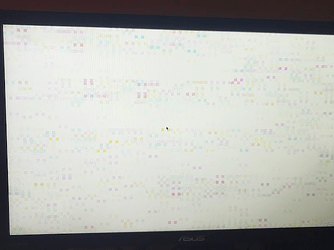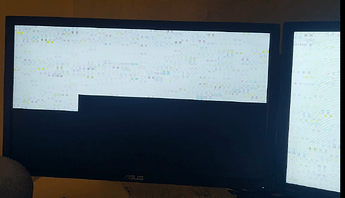Hi everyone,
In the past two days, I’ve been experiencing some strange graphical issues.
The first issue that occurred was randomly while I was working, the workspace on my secondary screen became extremely laggy and slow to respond to input. Strangely, everything was fine on the primary screen. As I further tested the problem, everything started flashing and the screen went partially pink. I was worried there was a fault with my graphics card, so I booted into Windows and found no problems with the card there. I booted back into Fedora and had no issues for the rest of the day.
I suspended the system for some hours, then when I came back and woke the system, both monitors were white with glitched colours across (I have attached a photo of this).
I’ve been running Fedora 41 for many months now (and earlier versions of Fedora for probably 2 years on this system) and haven’t changed anything about the system or graphics drivers in some time.
My GPU is NVIDIA GTX 1050 TI using nouveau drivers. I wouldn’t think it relevant, but my secondary monitor is using HDMI and the primary uses VGA.
Here is the log from when I woke the system up, note I’ve removed many repeated lines
5:30:19 PM kernel: nouveau 0000:01:00.0: gr: TRAP ch 6 [00ff88f000 gnome-shell[2337]]
5:30:19 PM kernel: nouveau 0000:01:00.0: gr: SHADER a204020e, sph: 0x04020e, stage: 0x22
5:30:19 PM kernel: nouveau 0000:01:00.0: gr: TRAP ch 6 [00ff88f000 gnome-shell[2337]]
5:30:19 PM kernel: nouveau 0000:01:00.0: gr: SHADER a204020e, sph: 0x04020e, stage: 0x22
5:29:36 PM kernel: nouveau 0000:01:00.0: gr: TRAP ch 6 [00ff88f000 gnome-shell[2337]]
5:29:36 PM kernel: nouveau 0000:01:00.0: gr: SHADER a204020e, sph: 0x04020e, stage: 0x22
5:29:36 PM kernel: nouveau 0000:01:00.0: gr: TRAP ch 6 [00ff88f000 gnome-shell[2337]]
5:29:36 PM kernel: nouveau 0000:01:00.0: gr: GPC0/TPC0/MP trap: global 00000000 [] warp 3c0009 [ILLEGAL_INSTR_ENCODING]
5:29:36 PM kernel: nouveau 0000:01:00.0: gr: SHADER a204020e, sph: 0x04020e, stage: 0x22
5:29:36 PM kernel: nouveau 0000:01:00.0: gr: TRAP ch 4 [00ff9bd000 Xwayland[15897]]
5:29:36 PM kernel: nouveau 0000:01:00.0: gr: SHADER a204020e, sph: 0x04020e, stage: 0x22
5:29:36 PM kernel: nouveau 0000:01:00.0: gr: TRAP ch 4 [00ff9bd000 Xwayland[15897]]
5:29:36 PM kernel: nouveau 0000:01:00.0: gr: GPC1/TPC1/MP trap: global 00000000 [] warp 3f0009 [ILLEGAL_INSTR_ENCODING]
5:29:36 PM kernel: nouveau 0000:01:00.0: gr: TRAP ch 4 [00ff9bd000 Xwayland[15897]]
5:29:36 PM kernel: [TTM] Buffer eviction failed
There was also something in the log from the first incident:
(repeats until I shut the system down)
Jul 16 9:08:10 PM kernel: nouveau 0000:01:00.0: drm: base-1: timeout
Jul 16 9:08:08 PM kernel: nouveau 0000:01:00.0: drm: base-1: timeout
Jul 16 9:08:06 PM kernel: nouveau 0000:01:00.0: drm: base-1: timeout
Jul 16 9:08:04 PM kernel: nouveau 0000:01:00.0: drm: base-1: timeout
Jul 16 9:08:02 PM kernel: nouveau 0000:01:00.0: drm: core notifier timeout
Has anyone experienced issues like this recently?
Thanks in advance for any advice or insight into this problem.

